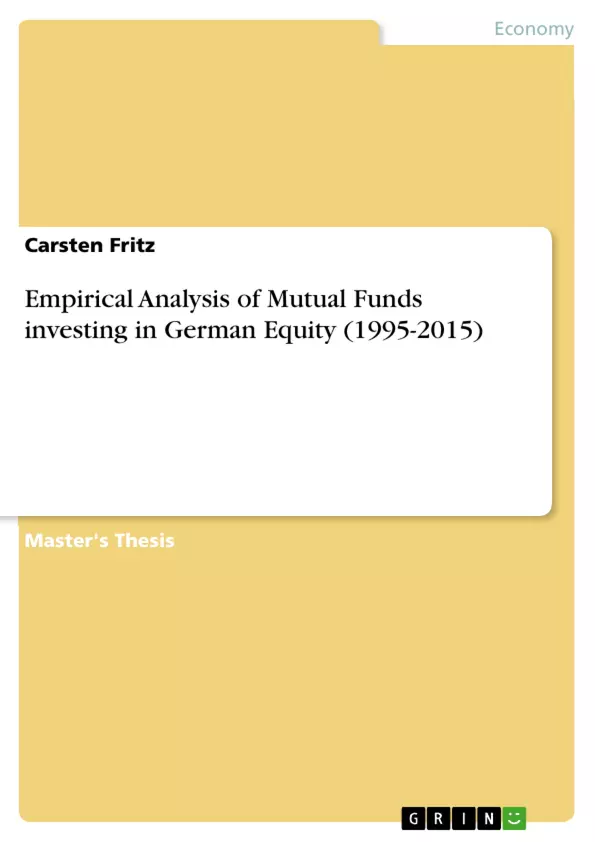Financial markets are as complex as ever due to an accelerating development in the last decades. Especially evaluations of mutual fund performance have been a subject of interest since the introduction of financial services.
In this thesis, a study on the performance of mutual funds investing in German equity from July 1995 to June 2015 is conducted. The aim is to find out if fund managers have sufficient skill to generate risk adjusted return in order to cover the cost imposed on the investors. Another purpose is to provide investors with relevant results. Inter alia, Jensen one-factor, Fama and French three-factor and the Carhart four-factor model are used as different benchmark models for performance. Paired bootstrap simulations suggest that, net of cost, a small fraction of fund managers do have sufficient skill to cover cost. For the bottom ranked funds, there is statistical evidence that their poor performance is caused by bad management, rather than by bad luck. The results for gross returns show that there is an unneglectable fraction of fund managers with good performance not due to luck. Compared to net returns, there is stronger evidence of skill, negative as well as positive. Form an investor’s point of view it seems rather beneficial to invest in passively managed vehicles. High costs eat into the return, and they are the main reason why the majority of actively managed funds end up with sub-par performance.
Inhaltsverzeichnis (Table of Contents)
- 1 Introduction.
- 2 Theoretical Framework.
- 2.1 The Arithmetic of Active Management
- 2.2 Information Efficiency of Financial Markets...
- 2.3 Factor Models......
- 3 Previous Empirical Findings.
- 4 Method
- 4.1 Factor Creation.
- 4.2 Data
- 4.3 Forming the Dataset and Limitations.
- 4.4 Approach..
- 4.5 Separating Skill from Luck.
- 4.6 Summary Statistics..
- 5 Empirical Results
- 5.1 Net Returns...
- 5.2 Gross Returns
- 5. 3 Beating Individual Benchmarks ..
- 6 Critical Review......
Zielsetzung und Themenschwerpunkte (Objectives and Key Themes)
This thesis examines the performance of mutual funds investing in German equity from July 1995 to June 2015. The main objective is to determine if fund managers possess sufficient skill to generate risk-adjusted returns that cover the costs imposed on investors. Another purpose is to provide investors with relevant findings regarding the performance of German equity funds.
- Performance of German Equity Funds
- Skill vs. Luck in Fund Management
- Risk-Adjusted Returns and Cost Coverage
- Factor Models and Benchmarking
- Passive vs. Active Management Strategies
Zusammenfassung der Kapitel (Chapter Summaries)
The thesis begins with a theoretical framework outlining the arithmetic of active management, information efficiency of financial markets, and factor models. Chapter 3 presents previous empirical findings on fund performance. Chapter 4 details the methodology used, including factor creation, data collection, forming the dataset, and separating skill from luck. Chapter 5 presents the empirical results based on net and gross returns, analyzing the performance of funds against individual benchmarks. Chapter 6 provides a critical review of the findings, and the conclusion summarizes the key takeaways and implications for investors.
Schlüsselwörter (Keywords)
The main keywords and focus topics of this thesis include fund performance, active and passive management, German equity funds, fund management, luck and skill, bootstrapping, Fama and French, Carhart, factor models, CAPM, and OLS regression.
Frequently Asked Questions
Do mutual fund managers have enough skill to cover their costs?
According to the study, only a small fraction of fund managers possess sufficient skill to cover investor costs; high fees often negate any generated risk-adjusted returns.
Is poor performance in German equity funds due to bad luck?
The research provides statistical evidence that poor performance in bottom-ranked funds is primarily caused by bad management rather than simply bad luck.
Which benchmark models are used to evaluate performance?
The thesis utilizes the Jensen one-factor, Fama and French three-factor, and the Carhart four-factor models as benchmarks.
Should investors choose active or passive management?
From an investor’s perspective, the study suggests it is often more beneficial to invest in passively managed vehicles, as active funds frequently underperform after costs.
What time period does this empirical analysis cover?
The analysis covers German equity mutual funds over a 20-year period from July 1995 to June 2015.
- Quote paper
- Carsten Fritz (Author), 2016, Empirical Analysis of Mutual Funds investing in German Equity (1995-2015), Munich, GRIN Verlag, https://www.grin.com/document/342479



